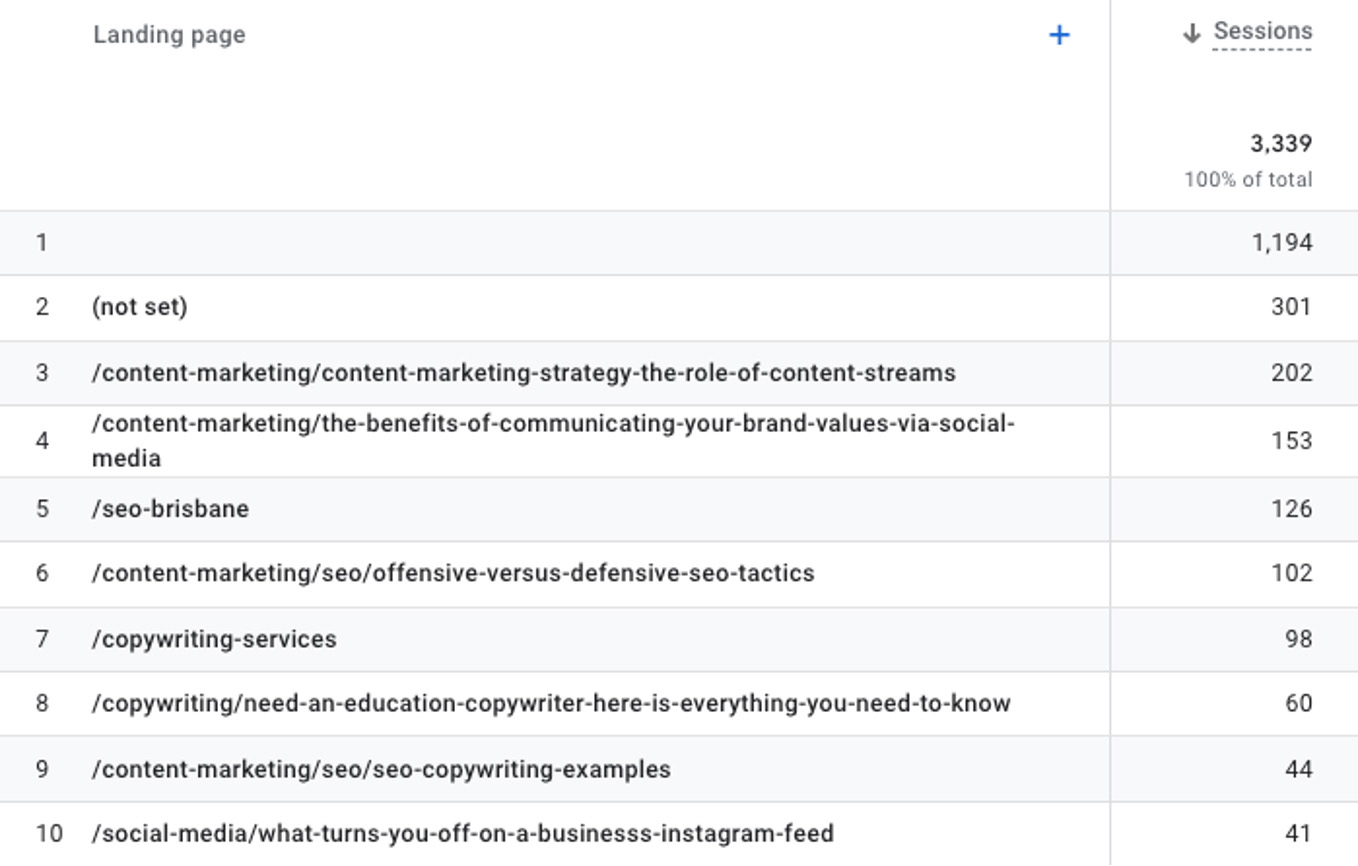Most business owners associate blogs as having a lot of benefits for content marketing – but did you know that there are a lot of SEO benefits of blogs as well?
At BeKonstructive, every single client we provide SEO services for has an allocation of time built into their monthly managed service for SEO blog writing. But the blogs are also one of the inclusions that I get asked about the most.
Prospective clients ask:
- Do we really need the blogs for our SEO campaign?
- Will SEO be cheaper if we remove the blog writing?
- Can I write the blog articles myself?
These are just a few of the questions I get asked when clients see that their SEO proposal includes blog articles (or an allocation of SEO copywriting that is usually used to create blog articles).
These questions are usually because they don’t fully understand the significant benefits that blogs offer our SEO campaigns. They directly contribute towards multiple SEO ranking signals and have a significant impact on the performance of your SEO campaign.
In this article, I’m going to cover the many SEO benefits that blog articles offer including:
- An explanation of the different ranking signals that blogs contribute towards
- Some examples of BeKonstructive’s SEO blogs (spoiler alert: they are a lot more than just fluffy AI-generated garbage)
- An overview of our monthly SEO packages with an explanation of how all of the deliverables (including the blogs) work together to generate results
- A sneaky peaky at how we use industry-leading SEO software Semrush to help us generate our blog topics, which ensures that SEO content is all serving a very specific purpose
Why are blogs beneficial for an SEO campaign?
To answer this question, I’m going to need to give you a quick little break down of how SEO works. This is a very sweet-and-simple explanation but if you need a more detailed explanation, please check out this resource I previously wrote, Beginners Guide to Understanding SEO. It offers a much more in-depth explanation of SEO that is designed specifically for beginners.
The quick explanation that I offer you today is as follows:
- SEO – or ‘search engine optimisation’ – is the process of optimising (aka ‘tweaking’) your digital assets (primarily your website) so that they perform better in Google and other search engines.
- Google and other search engines ‘crawl’ (or assess / audit) your website and other digital assets. They assess your website against a set of over 200 ‘signals’ (or criteria). They collect data relating to those signals, which feeds into a very large, very complex algorithm (often referred to as THE Algorithm).
- So the act of ‘optimising’ your website and digital assets is all about tweaking things – both on and off your website – so that you ‘score’ better against those 200+ signals that feed into The Algorithm. The Algorithm then ‘ranks’ your website against your competition, based on your score – and that is how Google determines your ‘ranking’ in Google.
- Those 200+ signals that feed into the algorithm, and which your website and digital presence are scored against, can be split into three main categories:
- Technical Signals – these are all to do with the way your website is built. It includes things like website security, website speed, accessibility and usability, navigation etc.
- On-Page Signals – these are all to do with how relevant your content is to the search term or ‘keyword’ you are trying to rank for. This is the category that blog content falls into.
- Off-Page Signals – these are all to do with your website’s authority and credibility and focus primarily on how your business and website (and its content) are perceived on websites external to your own.
That is my express run-down of what SEO is and how it works – if you’re a bit confused, please take time to read the below SEO resources. These break some of these concepts down into their individual parts and explain them with a lot more depth than the above.
- Guide to Brisbane Local SEO: Everything You Need to Know
- Why Fresh Content is Crucial for Your SEO Campaigns
- How Long Does SEO Take? A Quick Explanation for a Long Process
- 10 Technical SEO Ranking Factors Website Owners Need to Know
The reason that I needed you to have this base level of SEO knowledge before I can answer the question ‘why are blogs beneficial for SEO campaign’ is so that you understand my answer.
Blogs are beneficial for SEO because they directly contribute towards MULTIPLE on-page signals. And, if your content is well-written, well-researched, and informative – then blogs also have the potential to contribute towards some of your off-page signals as well.
Let me explain that in more detail.
Blog On-Page SEO Signals
Regular blog articles contribute to several SEO ranking signals. Here are some key signals that can be influenced by blog articles:
Content relevance and quality:
High-quality, relevant content is crucial for SEO. Blog articles that are well-written, informative, and address specific topics can improve your website’s overall content quality and relevance, which is a significant ranking factor.
New Keyword Opportunities:
Blog articles allow you to target specific keywords and phrases relevant to your industry or niche. By strategically incorporating these keywords into your blog posts’ titles, headings, content, and meta tags, we can optimise your articles for search engines, enhancing your chances of ranking higher, and for a broader range of search terms.
User engagement metrics:
Search engines consider user engagement metrics like bounce rate, time on page, and click-through rate as indicators of content quality and relevance. Engaging blog articles that capture readers’ attention, encourage longer time spent on the page, and reduce bounce rates can positively affect your SEO rankings.
Freshness and recency:
Regularly publishing new blog articles keeps your website updated and signals to search engines that your site is active and relevant. Fresh content can help improve search rankings, particularly for topics that require up-to-date information.
Internal linking:
Blog articles provide opportunities for internal linking, which is linking to other relevant pages on your website. Internal links help search engines discover and index your content, establish site structure, and distribute authority and ranking power across your web pages.
Topical Authority:
Blog articles allow you to build out a body of content on a particular topic. If your content is well-written, well-structured, informative, and insightful, then you are one step closer to gaining ‘topical authority’. Basically, if Google sees that you have a lot of helpful resources on your website about the topic you’re trying to rank for, and your competitor does not, then Google will consider you to be more of an ‘expert’ on the subject.
Blog Off-Page SEO Signals
I mentioned earlier that if your content is well-written (say, if you have a team of professional Brisbane copywriters help you create and publish it!) – then it also has the potential to contribute towards some off-page ranking signals as well.
Backlinks and external links:
When your blog articles provide valuable information or insights, other websites may link to them as references. Quality backlinks from reputable sources can positively impact your search rankings. Additionally, you can include external links within your blog posts to authoritative sources, which can help search engines understand your content and improve its credibility.
Social signals:
Blog articles that are shared and discussed on social media platforms can generate social signals. While social signals don’t directly impact search rankings, they can increase your content’s visibility and attract more organic backlinks, indirectly influencing your SEO performance.
Note: It’s important to note that while blog articles contribute to these SEO ranking signals, your overall SEO strategy should encompass other factors like technical optimisation, website structure, mobile-friendliness, and user experience to achieve the best results.
How Will Blog Articles Generate More Traffic for My Website?
When we do keyword research, we often talk about something called ‘intent’. Intent helps describe the stage of the decision-making journey a prospective customer/client/website user is in.
Keywords or search terms that have a ‘commercial’ or ‘transactional’ intent like ‘SEO packages’, or ‘Brisbane Copywriting Services’ are often very competitive and difficult to rank for. This is because we know that the person searching for these services is ready to purchase. They have made the decision that they want to invest in an SEO package, and they are now looking for the best option/supplier/offering to fulfil this need. Therefore, their intent for these keywords is commercial because they are ready to spend money.
Often, the keywords that we target for blog articles are long tail ‘information’ keywords. An example of these types of keywords might be ‘benefits of SEO’ or ‘should I use a professional copywriter?’
With these two examples, the user hasn’t made up their mind that they are going to invest in SEO yet – they are thinking about. And they are doing research, looking for information and resources to help them make that decision. Therefore, their ‘intent’ for these keywords is information.
These information-based keywords have much lower levels of competition, making them easier to rank for. If you can create a really compelling piece of content that answers their search query and gives them all of the information that they need to make their decision – if your blog can move them from ‘information’ intent to ‘commercial’ intent – and they are already on your website when they make that transition…. Well who do you think they are going to contact first for a quote?
Still not convinced? I’m going to share some data from BeKonstructive’s own Google Analytics dashboard to help highlight the impact that regular blogging for SEO purposes makes to our search performance.
The table below shows the top ten pages on our website over the past 6 weeks. The top entry – the blank one – is our homepage. The second one (not set) are users that have their privacy settings configured so that Google can’t see what pages they visited.
Entries 5 and 7 are the landing pages for our Brisbane SEO services and copywriting services respectfully. These are the pages that are optimised for those broad, competitive terms that have a ‘commercial’ intent.
All of the remaining entries are blog articles. 6 out of 10 of our top-performing pages in Google are blog articles.

Image shows a screenshot from BeKonstructive Marketing’s own Google Analytics data. Table shows that 6 out of 10 of our most visited/read pages are blog articles.
Our two landing pages / services pages (entries 5 and 7) are where the conversions happen. These are the pages that trigger people to fill in a form, request a quote, or give us a call.
But a lot of the people who convert on one of these landing pages starts their journey on our website via one of the 6 blog articles listed in the table above.
Without these SEO articles, we would be generating a lot less traffic for our website – and a lot less conversions.
How do SEO blogs fit into BeKonstructive’s monthly SEO services?
I mentioned earlier that there are three key pieces of the SEO puzzle that we need to cover in our monthly SEO packages. The first is technical SEO, the second is on-page SEO, and the final being off-page SEO.
At BeKonstructive Marketing, our monthly SEO packages start at 10 hours per month. This would be an ideal package for a local bricks and mortar business such as a Brisbane acupuncture business, an Auckland real estate developer, or a Brisbane building and pest inspection business.
Our standard ten-hour SEO package includes:
- 1 hour fixing technical errors like broken links, improving site speed etc.
- 5 hours SEO copywriting – usually building out landing pages and writing blog articles.
- 3 hours off-page SEO – usually looking after the Google business listing, creating directory entries, social bookmarking, or arranging for the odd guest-article.
- 1 hour for SEO strategy, monthly reporting, account management and campaign tracking
We may shuffle the hours around depending on the client’s specific requirements and their competitors, but this is a fairly standard break down of hours.
For larger, more competitive businesses, like a Christchurch real estate agency, a national travel agency, or an international removalist – we would recommend a larger package of 20+ hours.
Our standard twenty-hour SEO package includes:
- 2 hours fixing technical errors like broken links, improving site speed etc.
- 6 hours SEO copywriting – usually building out landing pages and writing blog articles.
- 10 hours off-page SEO – used to create a more complex and competitive backlink strategy that includes monthly guest post articles, directory listings, social bookmarking, forums and more.
- 2 hours for SEO strategy, monthly reporting, account management and campaign tracking
The more competitive industries and keywords usually require a more significant investment in building off-page links to the website (also known as ‘backlinking’). But they still require the continuous addition of fresh, optimised content loaded to their website on a monthly basis.
You can learn more about our SEO services or download a copy of our SEO packages here.
How do we come up with topics for SEO blogs?
We have a number of ways that we come up with topics for our monthly SEO articles to ensure we are always creating high-quality and informative content for your brand or business.
We use industry-leading software called Semrush which has a number of different built-in tools that helps us:
- Identify new long-tail keyword opportunities to target blog article towards
- Track the performance of content related to a keyword, and come up with topic titles that tie into the trending topics
Check out the video below to see how some of these tools work:
Examples of SEO blogs that BeKonstructive have written and published in 2023:
Last year I published a list of examples of SEO copywriting and blog articles we’ve written in the past, but here is an updated list for 2023. We are constantly updating the way that we curate and create content for our clients – to keep up to date with evolving technology, tools, and of course, The Algorithm.
2023 SEO blog examples:
- What Does a Real Estate Property Manager Do?
- 7 Tasks for Property Management Automation
- Cleaning without Compromise: Our Approach to Commercial Cleaning Procedures
- Why HVAC Humidity Control is Important for Queensland Businesses
- Discovering Tahiti’s Hidden Gems: Fun Facts and Insider Tips
- What to Expect from Your First Acupuncture Appointment
- Your Guide to Moving from Australia to London
Quick Answers About SEO Blogs:
Why do we need blogs or content creation included as part of our SEO campaign?
A strong SEO campaign needs fresh content to maintain rankings. Google favours new content over old content, and the new content also has the added benefit of allowing us to target a broader range of keywords and topics. Another benefit is that it allows us to capture users when they are researching or learning about a topic, which gives us the opportunity to influence their perception of the subject as well as their decision-making process.
Can I write my own blogs for my SEO campaign?
Some of our clients write their own blogs for our SEO campaigns, which our copywriters then edit and optimise.
While we are open to discussing this option with every client, there are a few criteria that need to be met for this to work:
- The client must commit to providing at least two 600–800-word articles consistently every single month. Failing to do so can affect the performance of the entire campaign.
- The content must be unique and written by a subject matter expert. It can’t be generated using AI tools or by copying someone else’s content and ideas.
- The person responsible for writing the content must be a decent writer. The articles provided must be of a certain standard.
SEO Benefits of Blogs
There are many SEO benefits that blog articles offer an SEO campaign. They are an essential piece of the puzzle, and your website will struggle to outrank your competitors without consistent fresh content and ideas being added.
A lot of SEO is all about competition – if your competitor is consistently creating blog articles, e-books, research papers, videos and other forms of content, and you’re not… well it is very unlikely that you will out-perform them in Google, especially without significant investment in other areas of SEO such as off-page link building.
If you have any questions about SEO blogs or any of our other digital marketing or SEO services, please get in touch.









I almost never comment, but i did a few searching and wound up here The
Many SEO Benefits of Blogs | BeKonstructive Marketing. And
I actually do have a couple of questions for you if you do not mind.
Could it be just me or does it seem like a few of the comments appear like lefgt by brain dead individuals?
😛 And, if you aree posting at other places, I’d like to follow evrything new you have to
post. Would you mke a list of all of your public sites like your Facebook page,
twitter feed, or linkedin profile?